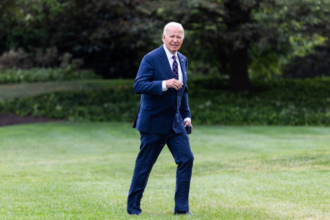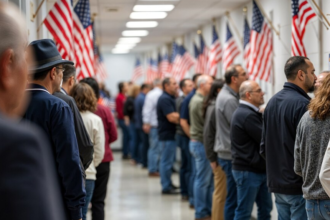Just over three months ago, Vice President Kamala Harris approached a microphone, ready to deliver a statement defining her past and guiding her future. The Day before, President Biden had withdrawn from the running for the Democratic candidate to succeed him. Harris has little time to spend, given the limited amount of campaigning ahead.
There is a political adage: define yourself or be defined by your opponent. Harris presented her story in that pivotal moment not only in terms of her record in the White House or as a U.S. senator but also given her years spent as a California prosecutor. “I confronted offenders of all kinds: cheaters breaking the law for their benefit, fraudsters ripping off consumers, predators mistreating women. Thus, hear me when I say: I know Donald Trump’s kind,” she said, referring to her Republican competitor.
Continually reminding voters of Trump’s legal problems, this slogan has resonated across her campaign rallies and stump speeches as the 60-year-old positions this election as a contest between a seasoned prosecutor and a convicted criminal. However, a closer look at Harris’s attendance in and out of California’s courtrooms exposes her continuous battle to define herself. Critics refer to her extraordinary ability to grab opportunities when others have discounted her, as well as her past of changing her opinions depending on the political environment.
How Did Harris's Prosecutorial Path Begin?
Shortly following her law school graduation, Harris started her path in law enforcement as a junior prosecutor in Alameda County, California, covering Berkeley as well as her hometown of Oakland. Oakland battled violent crime in the 1990s amid the government’s “war on drugs,” posing a difficult task for a young attorney. The surroundings were fierce: “It was like a potboiler of an atmosphere. It was difficult for you to digest the daily suffering and loss. For us, it was quite demanding. The offenses were major, and the stakes were great.
Harris handled important cases during this period, including ones involving gang violence at the height of the crack-cocaine pandemic. Colleagues compliment Harris’s courtroom performance, pointing out her great sensitivity for victims—especially about her work on child sexual assault cases.
Early in her career, Harris also developed love ties to local political kingmaker and California State Assembly speaker Willie Brown. Brown helped start the careers of several well-known political leaders in the state, including San Francisco Mayor London Breed and Gavin Newsom, the governor right now. Their brief romance split apart when Brown took office as mayor of San Francisco in 1995, but it helped Harris build ties to notable Democratic fundraisers in San Francisco.
How Did Harris Rise Through Political Challenges?
Just four months into her job as San Francisco’s district attorney in April 2004, a gang member shot and killed police officer Isaac Espinoza. The murder stunned the community, and many politicians and police leaders demanded the death sentence. But Harris, who had run on her opposition to the death sentence, chose a life sentence without parole. Just 48 hours after the murder, she made her public announcement, which garnered criticism for not first telling Espinoza’s widow. “She did not call me,” the widow of Espinoza subsequently said. “I find it incomprehensible that she turned on the camera to state she had not spoken with the family. You really cannot wait until he is buried?
There was an immediate backlash. Speaking at the officer’s funeral, Senator Dianne Feinstein said she might not have supported Harris’s opposition to the death sentence had she known of it. Harris argued in an editorial piece for a local newspaper: “[T]here can be no exception to principle.” Civil rights attorney John Burris praised her audacious posture despite criticism, saying it was a “progressive stand.”
Political experts pointed out that Harris’s resiliency was evident even if this choice may have dashed her aspirations. Is she a political animal, then? Yes, not. She is naturally gifted? Sure, remarked a former campaign manager. For her, politics serves as the vehicle toward the end. Less than the process, she is preoccupied with the outcome and her influence on the lives of others.
Harris, who learned from her past mistakes, faced another well-publicized case four years later when she once more turned away from the death penalty. Harris decided to personally let the Bologna family know about her prosecutorial choice following the terrible shooting death of Tony Bologna and two of his sons in San Francisco. “That was not an easy thing to do,” said a lawyer defending the widow of Bologna in a civil lawsuit. She listened to her and showed her sympathy, but she stayed very tough.
Harris’s supporters aimed to present her as a “progressive prosecutor,” juggling a tough-on-crime posture with the need for criminal justice reform. Drawing condemnation from both political extremes, this was a difficult tightrope to walk in a liberal metropolis inside the biggest left-leaning state in the country. Harris developed a “smart-on-crime” theory during her tenure as district attorney meant to guarantee young offenders stayed in school and sent non-violent offenders into job training programs.
An attorney working for the San Francisco public defense observed Harris’s eagerness to confront problems, including how juvenile victims of sex trafficking were treated. She said she found she understood problems that many of her predecessors and a lot of district attorneys around the state failed to grasp or even acknowledge.
How Did Harris Shift Her Strategy as Attorney General?
By the time Harris was chosen as California’s attorney general in 2010, her political style had started to move toward pragmatism. She yearned for a bigger national profile. Said a former assistant; she wanted to leave her mark. Usually a lazy backwater of an office, the attorney general was suddenly home to a rising star.
Harris started building a name for herself nationally in her new position. Following the worldwide financial crisis, she threatened to leave negotiations with banks during a financial settlement, therefore ensuring $18 billion for California rather than the originally suggested $4 billion. Her campaign has underlined this as proof of her will to challenge strong interests.
More recent studies, however, show that just $4.5 billion of the settlement goes to California homeowners who lenders damaged. Liberals were also enraged about some of her measures, including starting a statewide school truancy program and bucking a Supreme Court directive aimed at easing prison overcrowding. She also changed her former opposition to the death penalty in 2014, appealing a decision finding it unconstitutional.
Critics noted her conflicting positions. “If you truly believe that they’re morally unjust and you have an opportunity to take a stand, I think it’s imperative to do so,” said criminal justice and civil rights professor Hadar Aviram.
Defending Harris, a former San Francisco city attorney, said, “You have to uphold the law when you are state attorney general. Your responsibility is that. That is not at all a flaw or a legitimate criticism in my mind. But Harris’s selective application of the law drew criticism, particularly in light of her officiating same-sex weddings during a period when state legislation was opposed.
What Motivated Harris's Presidential Aspirations?
Following her election to the U.S. Senate, Harris entered the presidential race in 2020 mere blocks from the Alameda County Courthouse, where she memorably declared, “for the people.” However, the murder of George Floyd by a police officer sparked a national desire for criminal justice reform, which resulted in criticism from the left about her earlier endorsement of the death sentence and resistance to seek prison reform. She finally pulled out of the presidential contest before the primaries had started.
Now, Harris has once more highlighted her prosecutorial expertise but reinterpreted it within a new political setting as she campaigns for president against Donald Trump. Rising crime and homelessness during the epidemic have caused a reaction against the national experiment with progressive police reform following Floyd’s murder. Harris’s experience as a prosecutor is now more in line with the political environment as public opinion changes than it is a problem.
The Democratic National Convention this summer notably saw the death sentence removed from the party platform. Harris sought to persuade left-leaning Democrats in 2020, but today, she is pitching centrist Republicans turned off by Trump. This change has resulted in charges of her being a “flip-flopper.” Trump’s running mate said, “She’s a chameleon. ” ” She pretends to be one thing in front of one audience and something different in front of another.”
Still, past colleagues saw her flexibility as a sign of political pragmatism rather than a lack of passion. “It’s pretty difficult to run a campaign on your convictions alone, for the most part,” said a former assistant. The Kamala Harris we currently know is rather poll—and focus-group-driven.
What Is the Ongoing Question Surrounding Harris?
Over her career, the issue of what Harris stands for has stayed with her into her current Oval Office candidacy. Her former campaign manager, however, holds she has always negotiated her political path on her terms. “She has created her road and left a whole lot of people in her wake,” he said. She has worked out how to make the system fit her, for better or worse.
Man Arrested with Firearms Near Donald Trump Rally in Coachella, California








